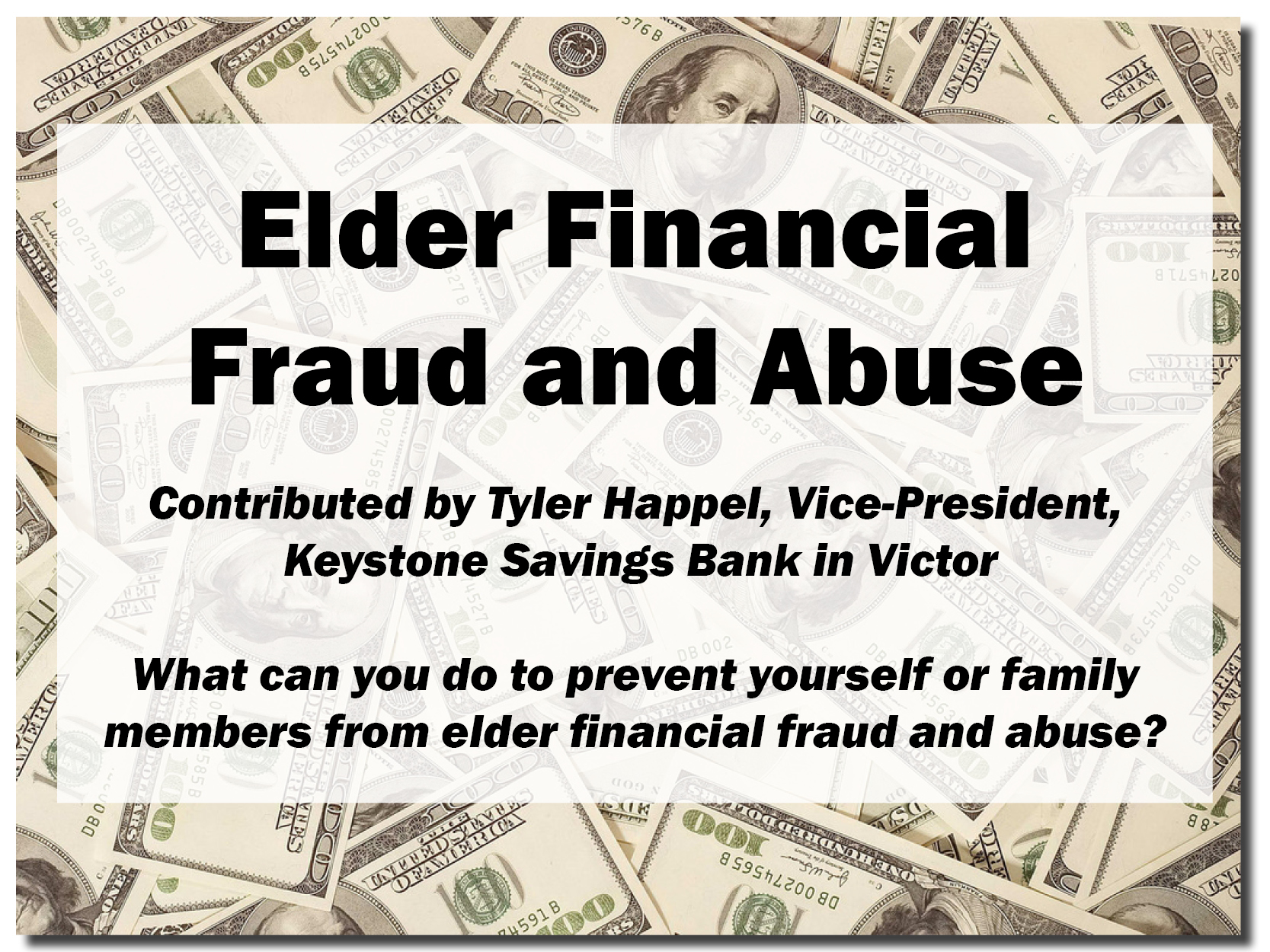Elder Financial Fraud and Abuse
Contributed by Tyler Happel, Vice-President, Keystone Savings Bank in Victor
Elder financial fraud and abuse is a serious issue that has continued to worsen over time as the world becomes more complex. It is estimated that victims of elder financial fraud and abuse lose $3 billion each year. Seniors become targets because they have often taken a lifetime to build enough wealth to retire and possibly leave something behind for their loved ones. Scammers will typically try to build trust with the individual, threaten them, or try to confuse them. These scammers know that Seniors are less likely to report any type of financial abuse or fraud, because the victim does not know how, or they will feel ashamed.
There are several common elder fraud and abuse schemes that have been around for quite some time. Let’s highlight a few and provide some tips for how to protect yourself.
- Common Schemes
- Parent/Grandparent Scam – The individual on the other end of the phone call, text message, or email pretends to be a child or grandchild. They often claim to be in urgent need of money. The criminal will typically try to sound distressed trying to get you to make a quick, irrational decision. Common excuses are they have been arrested, had car trouble on a trip, lost their wallet, etc.
- Government impersonation scam – The criminal will pose as a government employee. They will often threaten to arrest or prosecute the victim. Again, the criminal will try to force you into making a quick decision by using forceful language.
- Sweepstakes/charity/lottery scam – Criminals claim to represent an organization or charity and attempt to gain your trust. They tend to ask for an upfront fee so the victim can collect their winnings.
- Family/caregiver scam – Relatives or acquaintances take advantage of the victim or simply stealing from them. This can be done through physical, verbal, and/or psychological abuse. Sadly, 90% of elder financial fraud and abuse comes at the hands of relatives or someone close.
- How to Protect Yourself
- Recognize the scam attempts and end the conversation. Take notes for reporting the attempted fraud.
- Do research regarding the proposed offer. For example, search online using the contact information provided. There are sites that document these types of schemes so you can verify the legitimacy.
- Don’t act immediately. This is what the criminal wants you to do. Take a moment to talk things over with others. If necessary, call the police if you believe someone may be in danger.
- Be cautious of unsolicited phone calls, mailings, emails, or door-to-door services. Example – The IRS will not contact you by phone unless you have contacted them first regarding a particular matter. They will typically have a case number associated with the issue you have be in contact about.
- Never provide personal information to anyone that you do not know or cannot not verify their identity. In the event personal information is given out, contact your financial institution immediately so they can assist you with your accounts.
- How to Report
- Reporting of elder financial fraud and abuse is often overlooked or simply not done. By reporting these crimes, you can assist the FBI in preventing others from falling for the same schemes. If you, or someone you know, has fallen victim to elder financial fraud and abuse, you should contact your local FBI field office. Be prepared to provide the following details:
- Name(s) of the scammer and/or company
- Dates of contact
- Communication methods
- Any contact information provided by the scammer/company
- Requested method of payment and the information for where it is being sent
- General description of the interaction
- You may be asked to provide any original documentation that you have from the interaction (emails, mailings, invoices, etc.)
- Reporting of elder financial fraud and abuse is often overlooked or simply not done. By reporting these crimes, you can assist the FBI in preventing others from falling for the same schemes. If you, or someone you know, has fallen victim to elder financial fraud and abuse, you should contact your local FBI field office. Be prepared to provide the following details:
If you ever have any questions or concerns for yourself or a loved one, please feel free to reach out to your financial institution. They are a great resource for protecting what you have worked hard for.







